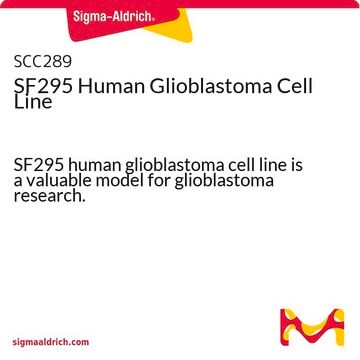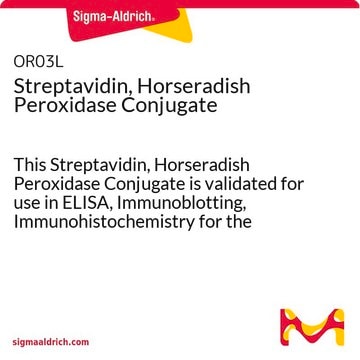SCC282
SF188 Human Glioblastoma Cell Line
SF188 human glioblastoma cell line is an important cellular model for pediatric human glioblastoma.
Synonym(s):
SF-188 cells
Sign Into View Organizational & Contract Pricing
All Photos(1)
About This Item
UNSPSC Code:
41106514
NACRES:
NA.81
Recommended Products
application(s)
cell analysis
General description
Glioblastoma multiforme is the most common and malignant primary brain tumor, with a high recurrence rate and a five-year survival rate of less than 5% (1). Glioblastomas represent approximately 10% of brain tumors in children and pediatric forms often have characteristics distinct from adult forms (2). Glioblastomas are the most aggressive form of cancer, highlighting the importance of relevant human patient-derived cell models for advancing research into characteristics and treatment of this disease.
SF188 is a patient-derived glioblastoma cell line originating from a temporal lobe tumor (3). SF188 cells do not express the glial markers GFAP or glutamine synthetase but are positive for laminin and fibronectin expression in early passages, suggestive of proliferative or transformed mesenchymal cells of glioblastoma (3). SF188 cells exhibit hypertriploidy and epithelial morphology in culture and are non-tumorigenic in athymic mice (3). The SF188 cell line possesses genetic amplification of the proliferative factor c-myc (4).
<bold>Source:</bold>
The SF188 glioblastoma cell line was derived from the left temporal lobe tumor of an 8-year-old male patient (3).
Research Category:
Cancer
SF188 is a patient-derived glioblastoma cell line originating from a temporal lobe tumor (3). SF188 cells do not express the glial markers GFAP or glutamine synthetase but are positive for laminin and fibronectin expression in early passages, suggestive of proliferative or transformed mesenchymal cells of glioblastoma (3). SF188 cells exhibit hypertriploidy and epithelial morphology in culture and are non-tumorigenic in athymic mice (3). The SF188 cell line possesses genetic amplification of the proliferative factor c-myc (4).
<bold>Source:</bold>
The SF188 glioblastoma cell line was derived from the left temporal lobe tumor of an 8-year-old male patient (3).
Research Category:
Cancer
Cell Line Origin
Human, Cancer Cells
Packaging
≥1X106 cells/vial
Storage and Stability
Store in liquid nitrogen. The cells can be cultured for at least 10 passages after initial thawing without significantly affecting the cell marker expression and functionality.
Other Notes
This product is intended for sale and sold solely to academic institutions for internal academic research use per the terms of the “Academic Use Agreement” as detailed in the product documentation. For information regarding any other use, please contact licensing@emdmillipore.com.
Disclaimer
RESEARCH USE ONLY. This product is regulated in France when intended to be used for scientific purposes, including for import and export activities (Article L 1211-1 paragraph 2 of the Public Health Code). The purchaser (i.e. enduser) is required to obtain an import authorization from the France Ministry of Research referred in the Article L1245-5-1 II. of Public Health Code. By ordering this product, you are confirming that you have obtained the proper import authorization.
Unless otherwise stated in our catalog or other company documentation accompanying the product(s), our products are intended for research use only and are not to be used for any other purpose, which includes but is not limited to, unauthorized commercial uses, in vitro diagnostic uses, ex vivo or in vivo therapeutic uses or any type of consumption or application to humans or animals.
Storage Class Code
10 - Combustible liquids
WGK
WGK 1
Flash Point(F)
Not applicable
Flash Point(C)
Not applicable
Certificates of Analysis (COA)
Search for Certificates of Analysis (COA) by entering the products Lot/Batch Number. Lot and Batch Numbers can be found on a product’s label following the words ‘Lot’ or ‘Batch’.
Already Own This Product?
Find documentation for the products that you have recently purchased in the Document Library.
Our team of scientists has experience in all areas of research including Life Science, Material Science, Chemical Synthesis, Chromatography, Analytical and many others.
Contact Technical Service







